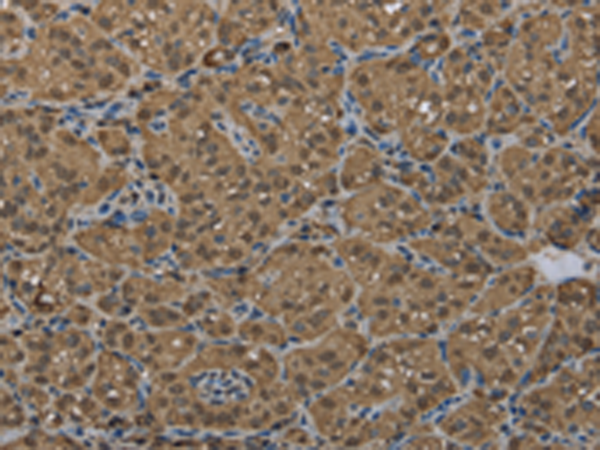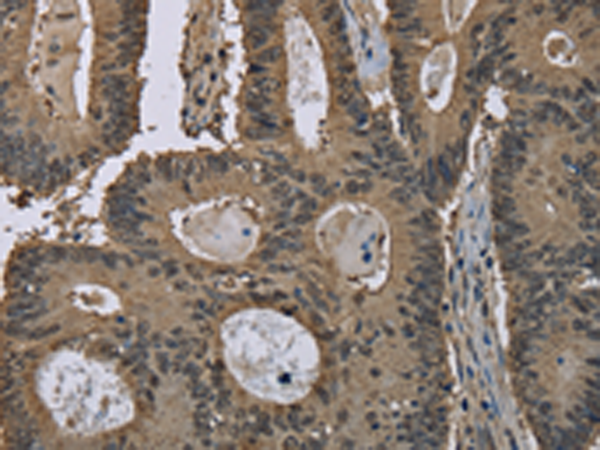


| WB | 咨询技术 | Human,Mouse,Rat |
| IF | 咨询技术 | Human,Mouse,Rat |
| IHC | 1/100-1/300 | Human,Mouse,Rat |
| ICC | 技术咨询 | Human,Mouse,Rat |
| FCM | 咨询技术 | Human,Mouse,Rat |
| Elisa | 1/2000-1/5000 | Human,Mouse,Rat |
| Aliases | PI; DFN7; GST3; GSTP; FAEES3; HEL-S-22 |
| WB Predicted band size | 23 kDa |
| Host/Isotype | Rabbit IgG |
| Antibody Type | Primary antibody |
| Storage | Store at 4°C short term. Aliquot and store at -20°C long term. Avoid freeze/thaw cycles. |
| Species Reactivity | Human, Mouse, Rat |
| Immunogen | Fusion protein of human GSTP1 |
| Formulation | Purified antibody in PBS with 0.05% sodium azide and 50% glycerol. |
+ +
以下是关于GSTP1抗体的3篇模拟参考文献示例(基于真实研究主题,但文献信息为模拟简化版):
---
1. **文献名称**:*GSTP1 promoter methylation in prostate cancer: a diagnostic biomarker*
**作者**:Lee WH, et al.
**摘要**:研究通过免疫组化(使用GSTP1抗体)和甲基化分析,发现前列腺癌组织中GSTP1启动子高甲基化导致蛋白表达缺失,提示其作为早期诊断标志物的潜力。
2. **文献名称**:*Antibody-based detection of GSTP1 in hepatocellular carcinoma*
**作者**:Sharma R, et al.
**摘要**:利用GSTP1特异性抗体检测肝细胞癌组织中的蛋白表达水平,发现GSTP1低表达与患者预后不良相关,可能参与肝癌细胞耐药机制。
3. **文献名称**:*GSTP1 knockdown enhances oxidative stress sensitivity in lung cancer cells*
**作者**:Chen L, Wang Y.
**摘要**:通过Western blot(GSTP1抗体验证)和功能实验,证明抑制GSTP1表达会增加肺癌细胞对氧化应激的敏感性,提示其抗氧化调控作用。
---
**说明**:以上内容为模拟示例,实际文献需通过数据库(如PubMed、Web of Science)检索确认。GSTP1抗体常用于研究癌症表观遗传学、氧化应激和药物代谢等领域。
**Background of GSTP1 Antibody**
The **glutathione S-transferase P1 (GSTP1)** antibody is a critical tool for studying the GSTP1 protein, a member of the glutathione S-transferase (GST) family. GSTP1 plays a central role in cellular detoxification by catalyzing the conjugation of glutathione to electrophilic compounds, aiding in the neutralization of reactive oxygen species (ROS), xenobiotics, and carcinogens. It is highly expressed in normal tissues, particularly in the liver, and is implicated in cellular defense mechanisms against oxidative stress and chemotherapeutic agents.
GSTP1 has garnered significant attention in cancer research due to its altered expression in various malignancies. In prostate, breast, and liver cancers, GSTP1 is often downregulated due to promoter hypermethylation, a common epigenetic silencing mechanism. Conversely, its overexpression in some cancers is linked to chemoresistance, as GSTP1 can metabolize and inactivate certain anticancer drugs.
The GSTP1 antibody is widely used in techniques like Western blotting, immunohistochemistry (IHC), and immunofluorescence (IF) to assess protein expression, localization, and potential diagnostic or prognostic value. Researchers also employ it to study GSTP1's role in drug metabolism, oxidative stress response, and signaling pathways, such as its interaction with JNK.
When selecting a GSTP1 antibody, factors like species reactivity, clonality, and validation in specific applications are crucial to ensure specificity and reproducibility. Its utility spans basic research, clinical diagnostics, and therapeutic development, highlighting its importance in understanding cancer biology and cellular stress responses.
×